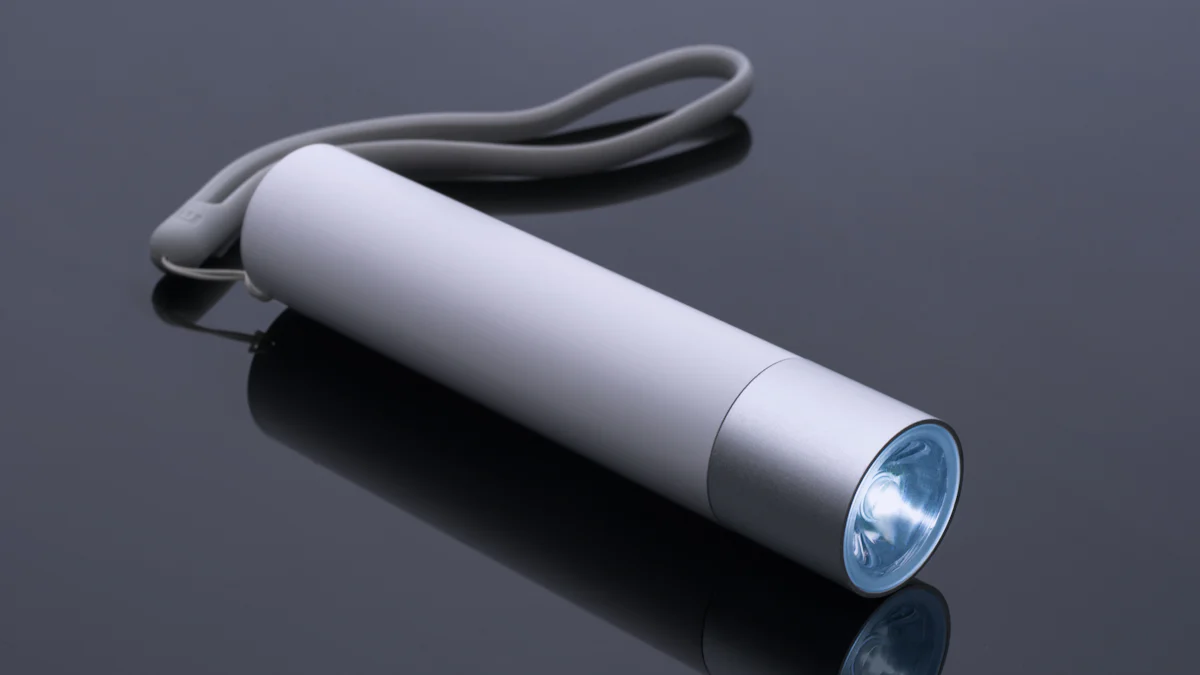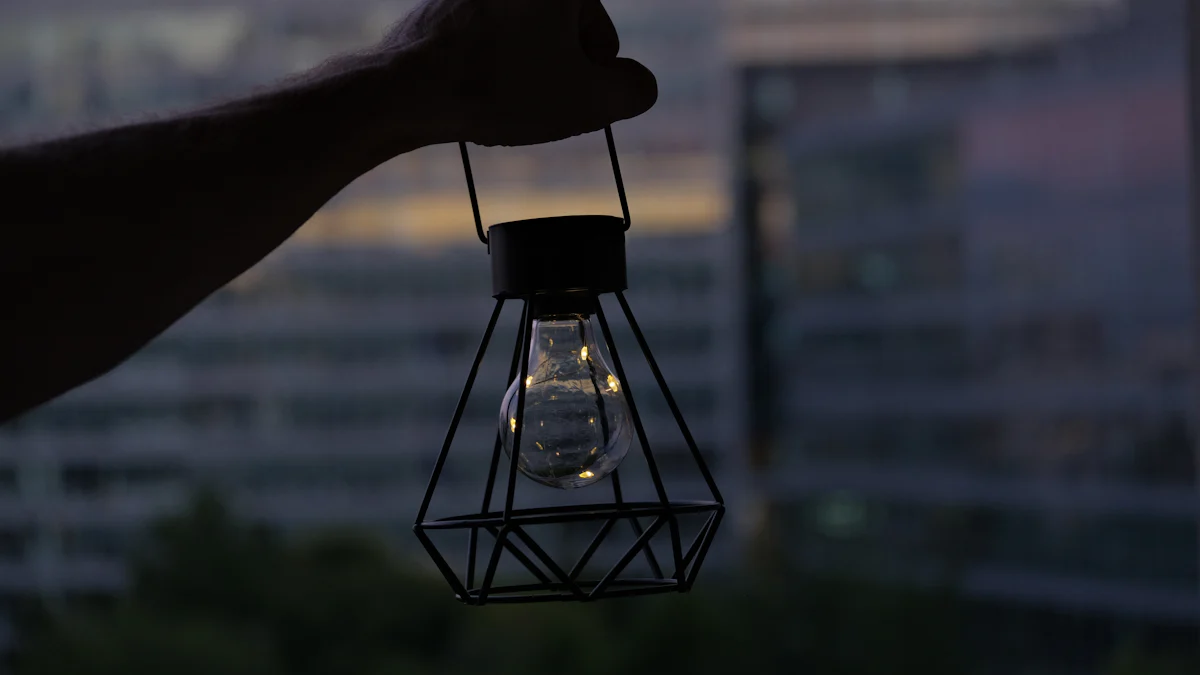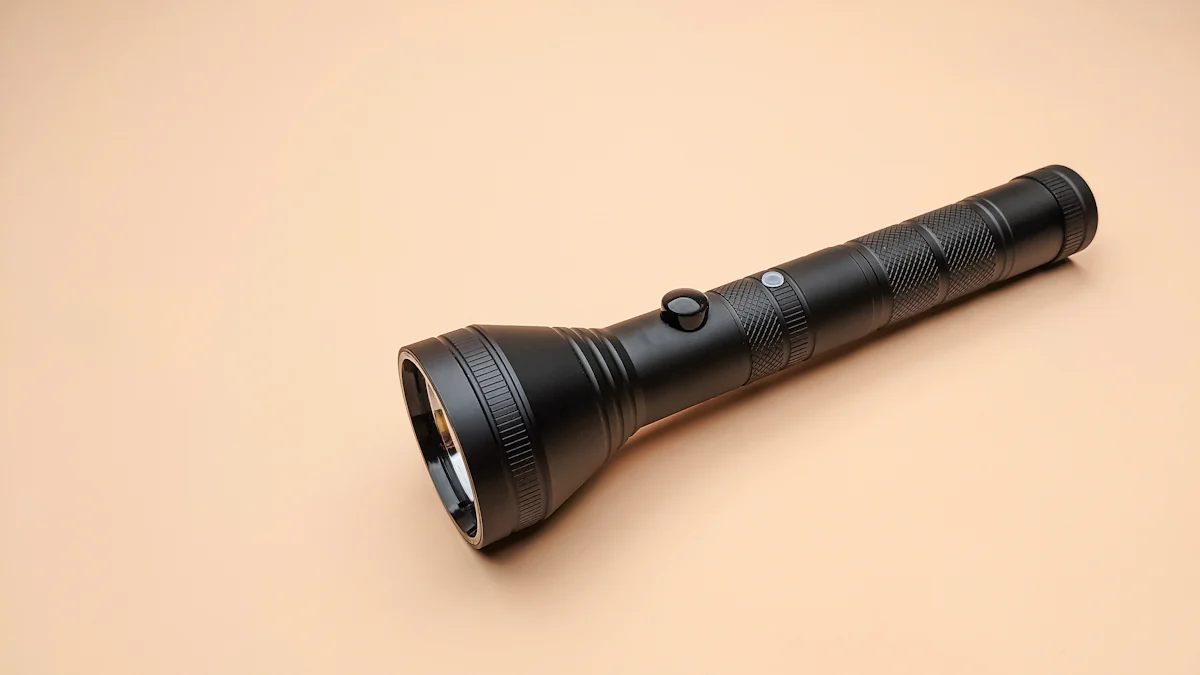Flashlight Sourcing Made Simple for Traders

Flashlight sourcing doesn't have to feel overwhelming. By following a structured approach, you can simplify the process and make informed decisions. The global flashlight market continues to grow rapidly, driven by the rising demand for portable lighting solutions. In 2023, the market was valued at $1.84 billion and is projected to reach $3.15 billion by 2032, with a CAGR of 6.2%. This growth highlights the increasing opportunities for traders like you to succeed in this industry.
Understanding the market and choosing reliable suppliers are key steps. Evaluating product quality ensures you deliver value to your customers. Avoiding common mistakes and negotiating effectively can further enhance your sourcing strategy.
Key Takeaways
Learn about the flashlight market to find growth chances. The market might grow to $3.15 billion by 2032, showing big opportunities for traders.
Pick good suppliers by checking their background and building trust. Use sites like Alibaba or go to trade shows to meet reliable makers.
Check flashlight quality by looking at things like strong materials, brightness, and battery life. Testing samples helps you meet what customers want.
Bargain smartly by knowing market prices and ordering in bulk for deals. Clear agreements and good payment plans keep you safe.
Stay away from mistakes by doing good research and starting with small test orders. This lowers risks and helps you trust suppliers.
Understanding the Flashlight Market

The flashlight industry offers a wide range of products tailored to different needs. Understanding the types of flashlights, their applications, and current trends will help you make informed sourcing decisions.
Types of Flashlights
Tactical Flashlights
Tactical flashlights are designed for high-performance tasks. These are commonly used by law enforcement, military personnel, and outdoor enthusiasts. They feature durable materials, high brightness, and compact designs. Many led tactical flashlights also include strobe modes for signaling or self-defense.
Everyday Carry (EDC) Flashlights
EDC flashlights are lightweight and portable. They are perfect for daily use, such as finding items in dark spaces or walking at night. These flashlights often balance brightness and battery life, making them practical for casual users.
Specialty Flashlights
Specialty flashlights cater to specific activities like diving, camping, or hiking. For example, waterproof models are ideal for underwater use, while camping flashlights often include lantern modes for broader illumination.
Category Type | Examples |
|---|---|
Product Type | Battery, Rechargeable Flashlight, Non-rechargeable Flashlight |
Type | Headlamp, Handheld Flashlight, Lantern |
Lumen Rating | Up to 300, 300-499, 500-999, 1000+ |
Application | Household, Commercial, Industrial, Military and Law Enforcement, Others |
Region | North America, Asia Pacific, Latin America, Middle East & Africa (MEA) |
Uses of Flashlights in Different Industries
Outdoor and Adventure
Flashlights are essential for outdoor activities like camping, hiking, and hunting. Tactical models with high lumens and long battery life are particularly popular in this sector.
Emergency and Safety
In emergencies, flashlights provide reliable lighting during power outages or natural disasters. Many led tactical flashlights include SOS modes for signaling in critical situations.
Industrial and Professional Applications
Industries like construction, mining, and maintenance rely on durable flashlights. These models often feature water and dust resistance to withstand harsh environments.
Current Market Trends
Growth of the Flashlight Market
The flashlight market is expanding rapidly. It was valued at $1.84 billion in 2023 and is projected to reach $3.15 billion by 2032, with a CAGR of 6.2%. This growth reflects increasing demand across various industries.
Adoption of LED Technology
LED tactical flashlights dominate the market due to their energy efficiency and brightness. They offer longer lifespans compared to traditional incandescent models.
Demand for Sustainable and Eco-Friendly Designs
Consumers are prioritizing eco-friendly products. Manufacturers are using recyclable materials and developing solar-powered flashlights. Smart flashlights with features like remote control and distress signaling are also gaining popularity.
Tip: Stay updated on trends like smart connectivity and enhanced battery technology to source innovative products.
Identifying Reliable Suppliers for Flashlight Sourcing
Finding the right suppliers is crucial for successful flashlight sourcing. You need to explore multiple avenues, evaluate supplier credibility, and build strong relationships to ensure a smooth supply chain.
Where to Find Suppliers
Online Platforms (e.g., Alibaba, Global Sources)
Online platforms like Alibaba and Global Sources are excellent starting points. These platforms connect you with flashlight manufacturers worldwide. You can filter your search by product type, region, or certifications to find a tactical flashlight manufacturer that meets your needs. Many suppliers on these platforms specialize in led tactical flashlights, offering a variety of options.
Trade Shows and Industry Events
Attending trade shows and industry events allows you to meet flashlight manufacturers face-to-face. Events like the Hong Kong Lighting Fair or the Outdoor Retailer Show showcase tactical flashlight manufacturers from key regions. These events help you evaluate products firsthand and establish direct connections with manufacturers.
Tactical Flashlight Manufacturers in Key Regions
Regions like China, the United States, and Germany are home to many reliable tactical flashlight manufacturers. China, in particular, has established supply chains for tactical products, making it a hub for sourcing. Researching manufacturers in these regions can help you find a reliable tactical flashlight manufacturer with competitive pricing.
Vetting Supplier Credibility
Checking Certifications and Licenses
Always verify that your supplier holds the necessary certifications and licenses. These documents ensure compliance with industry standards and regulations.
Reading Reviews and Testimonials
Evaluating reviews and testimonials is essential. Follow these steps:
Cross-check sources like industry reviews and third-party sites.
Assess the credibility of reviewers and their expertise.
Look for patterns in feedback to identify recurring issues or strengths.
Focus on recent reviews for up-to-date insights.
Consult peers or colleagues for their experiences.
Request references from the supplier’s past customers.
Requesting Product Samples
Requesting samples is a practical way to assess product quality. Test the samples for durability, brightness, and other key features before committing to bulk orders.
Building Long-Term Relationships
Communicating Clearly and Regularly
Clear and regular communication builds trust. Share your expectations and provide feedback to ensure alignment with your supplier.
Negotiating Fair Terms
Negotiating fair terms benefits both parties. Discuss pricing, delivery timelines, and payment terms to create a mutually beneficial agreement.
Establishing Trust Through Small Initial Orders
Start with small initial orders to evaluate the supplier’s reliability. Gradually increase order sizes as trust develops, ensuring a stable partnership.
Tip: Building relationships with flashlight manufacturers takes time. Focus on trust and transparency to create lasting partnerships.
Evaluating Flashlight Quality

When sourcing tactical flashlights, evaluating their quality is essential. High-quality flashlights ensure customer satisfaction and reduce the risk of returns. You can assess flashlight quality by focusing on key features, certifications, and testing methods.
Key Features to Assess
Material Durability (e.g., aluminum, plastic)
The material of a flashlight determines its durability. Aluminum flashlights are lightweight yet strong, making them ideal for tactical use. Plastic models are more affordable but may not withstand harsh conditions. Choose materials that align with your customers' needs.
Brightness and Lumens
Brightness, measured in lumens, indicates how much light a flashlight produces. Tactical flashlights often range from 300 to over 1,000 lumens. Higher lumens provide better visibility, especially in outdoor or emergency scenarios.
Battery Life and Charging Options
Battery life affects how long a flashlight can operate. Rechargeable flashlights are popular due to their convenience and eco-friendliness. Ensure the flashlight offers multiple charging options, such as USB or solar charging, to meet diverse customer preferences.
Certifications and Standards
Certifications ensure flashlights meet quality standards. Look for these key certifications:
IP Ratings:
IPX4: Splash-resistant, suitable for light rain.
IPX8: Submersible for greater depths, as specified by the manufacturer.
ANSI/NEMA FL1 Standards: These standards measure features like beam distance, light output, and impact resistance.
Safety and Environmental Compliance: Ensure the flashlight complies with environmental regulations and safety standards.
Feature | Description |
|---|---|
Beam Distance | Measurement of how far the light can reach. |
Light Output | The brightness level of the flashlight. |
Impact Resistance | Ability to withstand drops and impacts. |
Run Time | Duration the flashlight can operate on a single charge. |
Water Resistance | Ability to resist water ingress, measured by IP ratings. |
Waterproof Capability | Ability to function when submerged, indicated by IP ratings. |
Submersible Capability | Tested depth and duration for submersion, defined by IP ratings. |
Peak Beam Intensity | The maximum brightness at the center of the beam. |
Testing Flashlights
Conducting Drop and Impact Tests
Drop tests reveal how well a flashlight withstands accidental falls. Tactical flashlights should endure drops from at least 1 meter without damage.
Verifying Light Output and Beam Distance
Test the flashlight's brightness and beam distance. Ensure the light output matches the manufacturer's claims. Tactical models should offer focused beams for long-range visibility.
Checking for Consistency in Manufacturing
Inspect multiple samples to confirm consistent quality. Look for uniform brightness, sturdy construction, and reliable battery performance.
Tip: Testing flashlights before bulk purchasing helps you avoid defective products and ensures customer satisfaction.
Negotiating and Pricing in Flashlight Sourcing
Understanding pricing structures and mastering negotiation strategies are essential for successful flashlight sourcing. By securing favorable terms, you can reduce costs and maximize profits in the flashlight industry.
Understanding Pricing Structures
Wholesale vs. Retail Pricing
Wholesale pricing offers lower per-unit costs compared to retail pricing. Manufacturers typically provide wholesale rates to buyers who purchase in bulk. This pricing model allows you to remain competitive in the tactical flashlight market while maintaining healthy profit margins.
Minimum Order Quantities (MOQs)
Manufacturers often set minimum order quantities (MOQs) to optimize production costs.
Higher MOQs result in lower per-unit prices due to economies of scale.
Lower MOQs lead to higher unit costs, which may impact your profitability.
When working with MOQs, negotiating bulk orders can help you secure the best market price. This strategy reduces per-unit costs and ensures a steady supply of tactical flashlights.
Hidden Costs (e.g., shipping, customs)
Hidden costs like shipping fees, customs duties, and taxes can significantly impact your imports. Always request for a quote that includes these expenses. This approach helps you calculate the total cost of sourcing led tactical flashlights and avoid unexpected charges.
Negotiation Strategies
Researching Market Prices
Researching market prices gives you a clear understanding of competitive rates. Compare quotes from multiple manufacturers to identify the most cost-effective options. This step ensures you pay a fair price for tactical flashlights.
Leveraging Bulk Orders for Discounts
Bulk orders often lead to significant discounts. Manufacturers prefer larger orders as they reduce production costs. Use this to your advantage by negotiating lower prices for bulk purchases.
Building Rapport with Suppliers
Building strong relationships with manufacturers fosters trust and cooperation. Regular communication and transparency can lead to better pricing and priority treatment for your imports. A good rapport also makes it easier to negotiate favorable terms.
Payment Terms and Agreements
Securing Favorable Payment Terms
Negotiate payment terms that align with your cash flow. Options like partial upfront payments or extended payment periods can ease financial pressure during sourcing.
Using Escrow Services for Safety
Escrow services protect both you and the manufacturer. These services hold payments until you confirm the receipt and quality of your imports. This method minimizes risks in international transactions.
Drafting Clear Contracts
A clear contract outlines all terms, including price, delivery timelines, and quality standards. This document ensures accountability and prevents disputes with manufacturers. Always review contracts thoroughly before signing.
Tip: Effective negotiation and clear agreements are key to sourcing tactical flashlights at competitive prices while minimizing risks.
Avoiding Common Pitfalls in Flashlight Sourcing
Mistakes to Watch Out For
Rushing the Supplier Vetting Process
Skipping a thorough vetting process can lead to unreliable partnerships. Some manufacturers may lack the capacity to meet your quality or delivery expectations. Take time to verify their credentials, inspect their facilities, and review their track record. A rushed decision can cost you time and money in the long run.
Ignoring Product Certifications
Overlooking certifications can result in sourcing flashlights that fail to meet industry standards. Certifications like IP ratings or ANSI/NEMA FL1 standards ensure the product’s durability and performance. Without these, you risk selling subpar products that could harm your reputation in the flashlight industry.
Overlooking Hidden Costs
Hidden costs, such as shipping fees or customs duties, can inflate your expenses. Many manufacturers provide quotes that exclude these charges. Always request a detailed breakdown of costs to avoid surprises during the sourcing process.
Strategies to Prevent Issues
Conducting Thorough Research
Research helps you identify reputable manufacturers and understand market trends. Use online platforms, trade shows, and industry reports to gather information. This step ensures you make informed decisions when sourcing flashlights.
Starting with Small Test Orders
Small test orders allow you to evaluate a manufacturer’s reliability and product quality. This approach minimizes risks and helps you build trust before committing to larger orders.
Maintaining Open Communication with Suppliers
Clear communication ensures alignment with your supplier. Regular updates help you address potential issues early. Building a strong relationship with your manufacturer fosters smoother transactions.
Learning from Other Traders
Joining Industry Forums and Communities
Industry forums provide valuable insights from experienced traders. You can learn about sourcing strategies, reliable manufacturers, and common pitfalls in the flashlight industry.
Attending Networking Events
Networking events connect you with manufacturers and other traders. These events offer opportunities to exchange ideas, discover new products, and establish partnerships.
Seeking Mentorship from Experienced Traders
Mentorship accelerates your learning curve. Experienced traders can guide you through the sourcing process, share their successes, and help you avoid common mistakes.
Tip: Learning from others’ experiences can save you time and resources while improving your sourcing strategy.
Flashlight sourcing becomes manageable when you follow a structured approach. Start by understanding the market and its trends. This knowledge helps you identify opportunities and make informed decisions. Reliable suppliers play a crucial role in ensuring a smooth sourcing process. Evaluate their credibility and build strong relationships to secure consistent quality. Focus on product quality to meet customer expectations and reduce returns. Effective negotiation and avoiding common mistakes further enhance your strategy. By mastering these steps, you can create a profitable and sustainable flashlight sourcing business.
FAQ
What is the best way to find reliable flashlight suppliers?
Start by exploring online platforms like Alibaba or attending trade shows. Verify supplier credibility by checking certifications, reading reviews, and requesting product samples. Building trust through small initial orders also helps.
How can I ensure the flashlights meet quality standards?
Focus on certifications like IP ratings and ANSI/NEMA FL1 standards. Test samples for durability, brightness, and battery life. Conduct drop tests and verify light output to confirm the manufacturer’s claims.
What are the most important features to consider when sourcing flashlights?
Key features include material durability, brightness (lumens), and battery life. Rechargeable options and water resistance are also important. Match these features to your target customers’ needs.
How do I negotiate better pricing with suppliers?
Research market prices and compare quotes. Use bulk orders to secure discounts. Build rapport with suppliers through regular communication and transparency to create mutually beneficial agreements.
What should I do to avoid hidden costs in flashlight sourcing?
Request a detailed cost breakdown from suppliers. Include shipping fees, customs duties, and taxes in your calculations. This approach ensures you understand the total cost before placing an order.
💡 Tip: Always double-check contracts and payment terms to avoid unexpected expenses.
See Also
Guidelines for Finding Trustworthy Wholesale Flashlights
Boosting Earnings by Purchasing Flashlights Wholesale
Strategies for Acquiring Quality Flashlights at Wholesale Rates
Selecting Top Flashlights for Wholesale Buying
Comprehensive Manual for Wholesale Flashlight Sourcing from China
